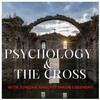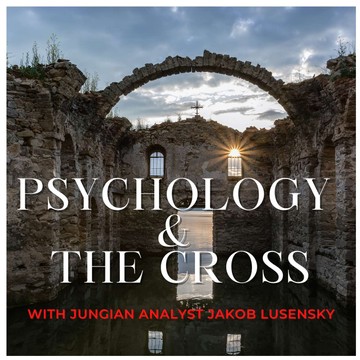

Psychology & The Cross
Jungian Analyst Jakob Lusensky
Jungian Analyst Jakob Lusensky engages in dialogues and research at the intersection of depth psychology, and Christianity for the purpose of individual and cultural transformation.
Join the conversation on our Substack page.
https://open.substack.com/pub/centerofthecross
Join the conversation on our Substack page.
https://open.substack.com/pub/centerofthecross
Episodes
Mentioned books

Aug 27, 2022 • 21min
S2E2 Perverse Christianity and its remedy
In the second episode of Secular Christ, McGrath explores the symbolic structures that underlie our search for truth and meaning. He contrasts the "going east" with a return to the "western symbolic" in order to connect with our spiritual and religious mother tongue. He examines how 2000 years of Christianity is a part of the problem and is accelerating a perversion as well as the possible political and personal remedy, by finding back to a more authentic and contemplative Christianity. Share your comments and subscribe on YoutubeMusic in this episode is licensed under creativecommons.org. Artist. Ketsa - Brook.

Aug 17, 2022 • 25min
S2E1 Secular Christ season 2 | A sermon for the New age
In the second season of Secular Christ, Dr. Sean J. McGrath continues his conversation with Jungian Analyst Jakob Lusensky about the contemplative life in a Secular Age. In this episode McGrath introduces the concept of "Christ nature" and contrasts it with Buddha Nature before he turns to Paul and the Colossians and the Gospel of John to ground it in scripture.Share your comments and subscribe on YoutubeMusic in this episode is licensed under creativecommons.org. Artist. Ketsa - Brook.

Aug 10, 2022 • 6min
C.S. Lewis & The Numinous
An audio clip from C.S. Lewis, The Problem of Pain, in which he explains Rudolf Otto’s classic work, The Idea of the Holy and the numinous. Source: https://www.youtube.com/watch?v=xlhBcsgIylA&t=6s

Jul 24, 2022 • 11min
E13x Provisional names with Donald Carveth & Sean McGrath
In this extra material for episode 13 of Psychology & The Cross Donald Carveth and Sean McGrath discusses:* How it's possible to believe in God although he does not exist* Examines the Buddhist concept of provisional names* Offers a critique of religious hubris* Agrees that mystical or numinous psychedelic experiences are necessarily not what is needed in order for religion to become a sustainable "Erfahrung" (not "Erlebnis") and pattern in ones life.#Erfahrung #Religion #Psychoanalysis

Jul 13, 2022 • 1h 5min
E13 Making conscience conscious: A conversation with Donald Carveth & Sean McGrath
“Somewhere Jung says that the only evil is unconsciousness and this, I think touches to your work Don, that this growth in consciousness, which psychoanalysis aims towards, has to be understood as a moral drive towards the good.”Episode description:What’s the role of conscience, ethics, and morals in psychological development and individuation? To investigate this question we invited again the Toronto-based psychoanalyst Donald Carveth (Episode 12) and Philosophy & Theology professor Sean McGrath (Episode 3) for a conversation. As a base for our discussion, we have read the important 1958 Jung essay ‘A psychological view of conscience’. You can access it through our new Substack page. Donald Carveth is the author of the book "The still small voice: Psychoanalytic reflections on guilt and conscience” (Routledge, 2013). He runs a popular Youtube channel on psychoanalysis and also make some of his readings available on his website https://www.doncarveth.com/Sean McGrath is a Canadian philosopher and Professor of Philosophy at Memorial University of Newfoundland. He is known for his published work in the history of philosophy and the philosophy of religion. Major single-authored works includes for example 'The Dark Ground of Spirit: Schelling and the unconscious'. There is also a separate podcast series, Secular Christ where Jakob Lusensky discusses questions related to Christianity today. Jakob Lusensky is a Jungian psychoanalyst with a private practice in Berlin and the host of this podcast.Music played in this episode is licensed under creativecommons.org: "Falling Angels" and "Golden teacher" by Ketsa.

Jun 29, 2022 • 6min
E12x Letters between Julius Spier & Etty Hillesum and exclusive essay
For those of you who listened to the last episode of Psychology & The Cross and got interested in learning more about Julius Spier and Etty Hillesum, we’re now making a previously unreleased essay by Alexandra Nagel available on our new Substack account. The essay is titled Julius Spier read the Bible for guidance (Etty Hillesum followed him) and outlines how reading the Bible and Christian writers influenced the spirituality of Spier and then of course also Etty Hillesum. In addition, here are two letters were written between Julius Spier and Etty Hillesum, the first one from Spier, sent on the 12th of August 1941. Thank you to Wolfgang Heine and Barbara Morrill for the readings of the letters.Music played in this episode is licensed under creativecommons.org: Ketsa - Crystal life.

Jun 8, 2022 • 1h 2min
E12 The Jungian hand reader Julius Spier with Alexandra Nagel
“Julius Spier is a hand reader, and hand reading in itself is looked down upon, dismissed, forgotten, ignored by regular science. Jungians have not paid attention to Julius Spier.” Episode description:This episode is dedicated to the Jungian hand reader Julius Spier (1887-1942). Until now Spier is most known for being the analyst and lover of brilliant Jewish diarist Etty Hillesum, whose writings before being sent to Auschwitz continue to inspire religious seekers around the world. Few people know of Spier’s relationship to C.G Jung, how he developed a psychological study of inquiry combining Jungian psychology with hand reading, and how there were Jungians trained in his technique and practicing it until the late 1900s (Albert Einstein had his hands read by Spier).Our guest for this episode is Alexandra Nagel (PhD), a Dutch historian of western esotericism and the scholar who singlehandedly is bringing Julius Spier’s important contributions and fascinating life story to public attention. A few years ago she finished her dissertation on Spier at the Institute of Philosophy at Leiden University. For more information about Julius Spier, I recommend the following papers by Alexandra Nagel.Jung, Julius Spier, and Palmistry (Jung Journal: Culture & Psyche 14. No. 1 (2020): 65–81.)Etty Hillesum, A Devoted Student of Julius SpierThe Hands of Albert Einstein: Einstein's Involvement with Hand Readers and a Dutch PsychicAnother must-read are the diaries of Etty Hillesum: An Interrupted Life the Diaries, 1941-1943Thank you to Barbara Morrill for the beautiful reading of Etty Hillesum’s letter to Julius Spier. Music played in this episode is licensed under creativecommons.org: Ketsa - Crystal life.

May 11, 2022 • 1h 6min
E11 Wrestling with Christ: Roundtable Discussion with Murray Stein, Ann Conrad Lammers, and Paul Bishop
A bit more than a year into this podcast series, it felt like a good time to stop and reflect more deeply on Jung’s wrestle with Christianity, and how it is still relevant for us today. For this reflection, I invited back three Jungian scholars with whom I had spoken individually on previous episodes. Our discussion together was an opening both of insights and questions:* When we speak of dreaming the Christian myth forward, as Jung did, whose dream do we mean? Who's doing the dreaming?* Is Jung’s psychological project an attempt to transcend or reform Christianity?* What might Jung's psychologizing of Christian tradition mean for those within and outside it? * In Jungian discourse, where is the body of Christ? Where are the poor?About the participants:Murray Stein is a renowned Jungian psychoanalyst and the author of important books such as Jung's Treatment of Christianity and Map of the Soul.Ann Conrad Lammers is coeditor of The Jung–White Letters, The Jung–Kirsch Letters, as well as editor and co-translator of Erich Neumann’s two-volume work The Roots of Jewish Consciousness.Paul Bishop is a renowned British scholar who has spent the last twenty-five years researching and writing on the foundational relationship between C.G. Jung and Friedrich Nietzsche and Johann Wolfgang Goethe.Moderating the discussion is Jakob Lusensky, a Jungian psychoanalyst with a private practice in Berlin. He is the host of the podcast and a founder of the non-profit organization Center of the Cross, working within the intersection of psychology and religion with the mission of individual and social transformation.

Apr 20, 2022 • 9min
Letters between C.G Jung and theologian Adolf Keller
Read excerpts from the letter correspondence between C.G Jung and Protestant theologian and Pastoral psychologist Adolf Keller (1872-1963). An important conversation when trying to understand the difficulties and possibilities in bridging Christianity and Jungian psychology. Recommended reading: C. G. Jung – Adolf Keller: On Theology and Psychology, edited by Marianne Jehle-Wildberger and published by the Philemon Foundation.

Apr 6, 2022 • 1h 7min
E10 Participatio Christi: C.G Jung & Adolf Keller with Pastor Kenneth Kovacs
"I think that individuation should be in service to the community. It should lead to one's living within the larger. It's about me bringing my individuality, not my individualism, but the uniqueness of myself into the community. And in some ways, the community helps me to individuate." Episode description:In this episode, I speak to the pastor, theologian, and Jungian analyst in-training Kenneth Kovacs. The conversation circles around the correspondence between C.G Jung and Protestant theologian and Pastoral psychologist Adolf Keller (1872-1963). This exchange of letters, researched by Kenneth, leads us into a conversation about the relationship between individuation and community, the dialectical theology of Karl Barth, the dark side of the numinous, the possible dangers of imitating Christ, and what the fields of psychology and theology can learn from each other. Interspersed throughout the conversation are read excerpts from Jung and Keller's letters.Recommended reading: C. G. Jung – Adolf Keller: On Theology and Psychology, edited by Marianne Jehle-Wildberger and published by the Philemon Foundation.Kenneth Kovacs, Ph.D., is pastor of Catonsville Presbyterian Church in Baltimore, MD (USA) and a Diploma candidate at the C.G. Jung Institut-Zurich. He is a graduate of Rutgers University, Princeton Theological Seminary, and the University of St. Andrews, Scotland (UK). Ken is the author of The Relational Theology of James E. Loder: Encounter and Conviction (New York/Bern: Peter Lang Press, 2009) and Out of the Depths: Sermons and Essays (Parson's Porch, 2016). He also serves on the board of directors of the Jung Society of Washington.Music played in this episode is licensed under creativecommons.org: Ketsa - Between each, Essence & Blue violets.


